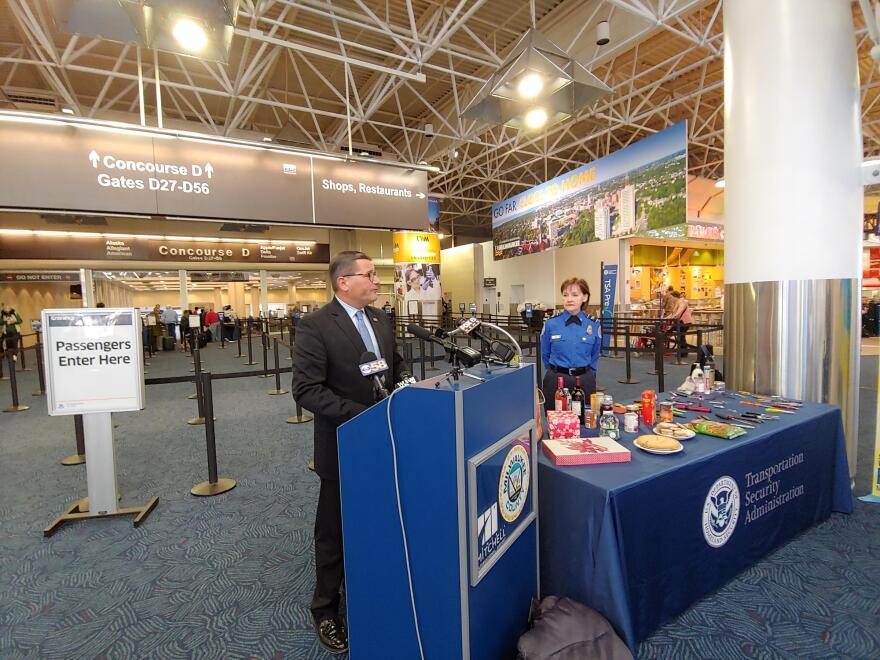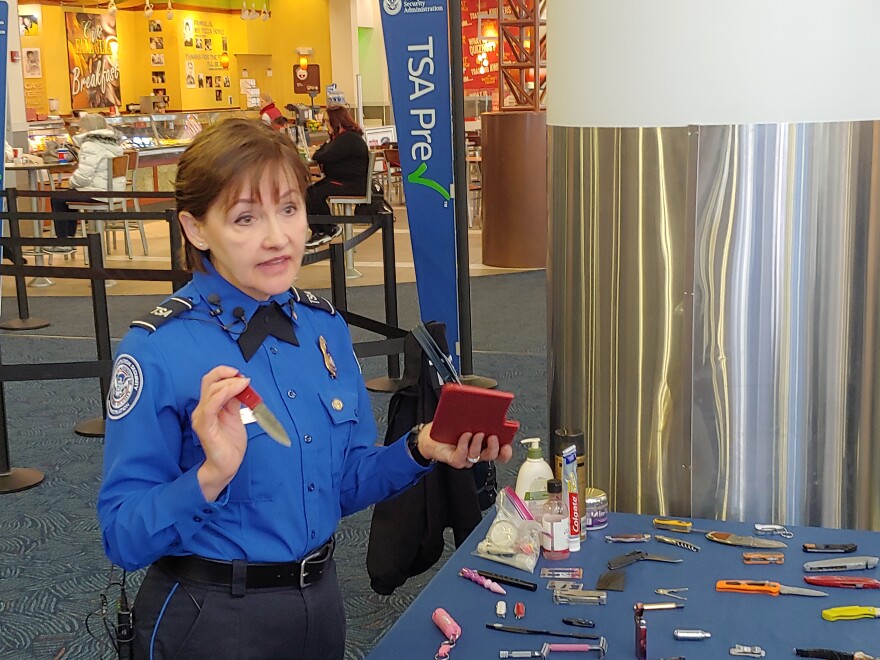The Transportation Security Administration, or TSA, predicts Milwaukee General Mitchell International Airport will see a sizable increase in travelers over the next few days. The agency also expects the current holiday travel period to be the busiest on record, with more than 25 million passengers passing through security checkpoints nationwide during the second half of November — an increase of 5 percent over 2017.
Some labor groups representing TSA employees charge the federal government has cut back on staff. But in an attempt to keep passenger lines moving during busy holidays, the feds say the TSA’s upper management works at the passenger checkpoints, along with lower-ranking staff.
“We bring in extra officers, through a combination of overtime and schedule adjustments. We have 11 lanes [for passenger screening] in Milwaukee, so that — provided equipment is running, we don't have any outages — we'll have all lanes running,” says Mark Lendvay, the TSA's federal security director for Wisconsin.

Lendvay and his management staff will lend a hand. "It could be everything from moving the bins [where passengers place carry-on items for screening] to provide instructions/directions to public members, to dealing with things that come up with the checkpoints," he explains.
But is that enough to satisfy travelers, yet keep them safe?
"Now, you're going to have some one-offs — sick calls, weather conditions, outages of equipment. Let's say an x-ray machine goes down. That lane is inoperative, which reduces our efficiency. So, when you say 'is it enough?' It's enough in terms of getting folks through in a secure, safe manner to their final destination," he says.
TSA Tips To Make It Quickly & Safely Through Airport Security
1. Get TSA PreCheck
TSA PreCheck applicants must fill out a form, go to an enrollment location (there’s one in Milwaukee, 3841 W. Wisconsin Ave.) where they must provide two forms of government-issued identification, and pay $85 for a five-year membership that covers domestic travel only. Also, there's an international travel enrollment program that costs more. While there are a few steps, the TSA says re-enrollment is much quicker.
Lendvay says PreCheck membership allows passengers to go through lanes "that typically, move much quicker, five minutes or less. We allow those passengers to keep their shoes on, the belts, the coats, and any laptop computer can stay in the carry-on bag, " Lendvay explains.
PreCheck passengers still have to walk through metal detectors, unless an individual is randomly selected for the body scanner that non-PreCheck members have to walk through.
On a typical travel day, Lendvay says 40-45 percent of the passengers at Mitchell are enrolled in PreCheck. But he acknowledges that the holidays bring out more families and infrequent travelers who may not have signed up for the program. Plus, he says the frequent travelers, or what he calls "road warriors," are more likely to stay home during the holidays.

2. Check wait times
The TSA’s efficiency is measured through wait time reports, Lendvay explains. Luckily, those reports are available to the public and can be found via the MyTSA app. So, before heading to or on the way to the airport, it may be smart to glance at the wait times.
3. Only pack allowed items
The TSA urges travelers to "pack smart" and not put prohibited items like knives or large liquor bottles in their carry-on bags.
There's a detailed list of items that are allowed in carry-on or checked bags on the TSA website. If an item isn't listed, people can send a picture of the item or ask the agency a question on Facebook or Twitter.
4. Communication, not conflict
Last year, there were 36 passenger attacks on TSA screeners nationwide, an increase over 2016. The TSA says the profile of the passenger who most often assaults a TSA officer is a male, aged 41-50. More than half the attacks occurred during a pat down or bag check.
But the TSA also contends the rate of assaults is tiny, less than one incident per 17 million passengers screened. Lendvay says attacks on TSA agents in Wisconsin are "relatively low."
He adds that TSA officers are instructed on the best ways to communicate with the public. "You know, don't bark out orders. These are human beings that are paying significant money to travel. We get that," Lendvay says.





